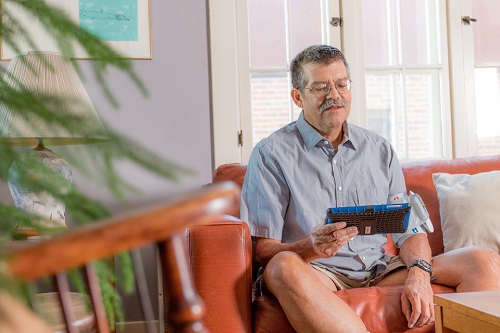Transitioning From In-Center Dialysis to Home

Starting on Dialysis
Having stage 5 kidney failure or end stage kidney disease (ESKD) and starting on dialysis can be over-whelming. For many people, starting dialysis is a life-changing event. In the U.S., more people start on in-center hemodialysis (ICHD) than any other form of dialysis (1).Often, a temporary central venous catheter (CVC) is used as the dialysis access. If you started dialysis in-center with a CVC and were not aware of other dialysis options, there is good news. You can learn about different treatment options and which type of dialysis may best fit your lifestyle.
Home Dialysis 411
Your kidney doctor, or nephrologist, is the best person to teach you about your treatment choices and the two types of dialysis: hemodialysis and peritoneal dialysis. However, you will receive education about dialysis options at your dialysis center as well. You can learn about the potential benefits of dialyzing at home, such as having a flexible dialysis schedule and better quality of life (2, 3, 4). If you are already dialyzing in-center but want to dialyze at home, don’t worry. You have support. You can help take control of your situation by talking to an educator or your social worker in the dialysis center. Your dialysis center team will communicate with your nephrologist to determine if home dialysis is the right treatment for you. Home dialysis options include peritoneal dialysis (PD) and home hemodialysis (HHD).
Transitioning Home
Your doctor will want to see you to discuss the pros and cons of each type of dialysis and evaluate potential barriers. Doctors may have access to educators and may refer you to a program to teach you more. You can also sign up for Kidney Smart®, a no-cost, online education class that will teach you about the basics of kidney disease, diet and nutrition information, insurance and employment options, and dialysis treatment options.
Depending on which type of dialysis fits your needs, your doctor will coordinate a referral to a surgeon for access placement. After your access is ready to use, you and your care partner, if needed, will then require training in a home dialysis center. For people who choose peritoneal dialysis, you may require ongoing hemodialysis during your PD training. The schedule will be coordinated with your care team. Training for PD usually occurs 3 to 4 days a week depending on schedules and availability. For people who choose home hemodialysis , you will stop in-center treatment and train while you dialyze at the home dialysis center. Training for HHD is usually four to six weeks.
Your Care Team Is There to Support You
Transitioning to home dialysis can be a rewarding journey. However, if you are worried about insurance coverage, work/life balance, or are anxious about training for home dialysis, please reach out to a member of your health care team. Your social worker, dialysis nurse or doctor can help address your concerns before you transition to home dialysis.
References:
- 12/3/2020, https://www.niddk.nih.gov/health-information/health-statistics/kidney-disease
- Finkelstein FO, Schiller B, Daoui R, Gehr TW, Kraus MA, Lea J, et al. At-home short daily hemodialysis improves the long-term health related quality of life. Kidney Int. 2012;82:561-569.
- Weinhandl ED, Liu J, Gilbertson DT, Arneson TJ, Collins AJ. Survival in daily home hemodialysis and matched thrice-weekly in-center hemodialysis patients. J Am Soc Nephrol. 2012;23:895-904.
- Helena Rydella, Naomi Clynea, Mårten Segelmarkb, Home- or Institutional Hemodialysis? A Matched Pair-Cohort Study Comparing Survival and Some Modifiable Factors Related to Survival. Kidney Blood Press Res 2016;41:392-401
Additional Kidney Diet Resources
Visit DaVita.com and explore these diet and nutrition resources:
- DaVita Food Analyzer
- DaVita Dining Out Guides
- Today’s Kidney Diet Cookbooks
- DaVita Kidney-Friendly Recipes
- Diet and Nutrition Articles
- Diet and Nutrition Videos
- Kidney Smart® Virtual Classes
This article is for informational purposes only and is not a substitute for medical advice or treatment. Consult your physician and dietitian regarding your specific diagnosis, treatment, diet and health questions.

Recent Comments